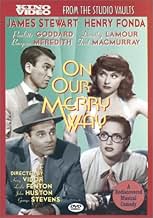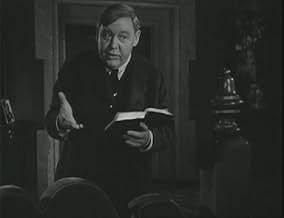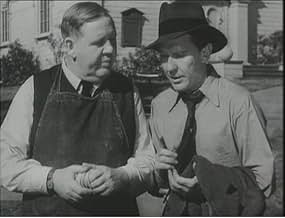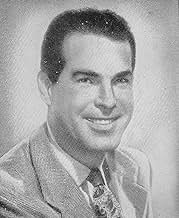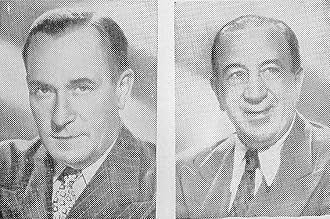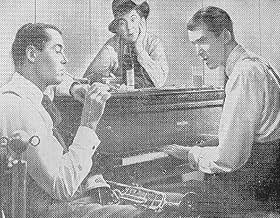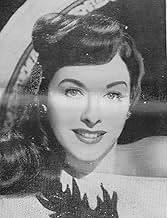Three short stories revolving around the topic of the daily question posed by the roving reporter to the readers of a daily newspaper.Three short stories revolving around the topic of the daily question posed by the roving reporter to the readers of a daily newspaper.Three short stories revolving around the topic of the daily question posed by the roving reporter to the readers of a daily newspaper.
Carl 'Alfalfa' Switzer
- Leopold 'Zoot' Wirtz
- (as Carl Switzer)
Featured reviews
As the "Trivia" section states, Charles Laughton was in the original version of this film under its title "A Miracle Can Happen". His was a sequence of 20 minutes or so which came between the Fonda/Stewart story and the one with Fred MacMurray which ended the movie. During the war, Laughton had taken to reading from great works of literature, including the Bible, to invalided US servicemen. He continued to give reading tours after the war and his appearance in "A Miracle Can Happen" was clearly an attempt to put one of his Bible readings on film. He played a washed-out minister who bores his congregation to tears, but one rainy night a small boy asks Laughton to visit his sick father. In an attempt to boost the dying man's spirits, Laughton rises to the occasion with an over-the-top delivery of the Saul and David story that completely revitalises the father. It then turned out that the little boy who invited Laughton in, but who has now disappeared from the scene, had died some years earlier. So, as Laughton told Meredith at the end of the sequence, "a miracle happened."
For whatever reason, the Laughton sequence was deleted from the US release but not before prints has been sent abroad to other countries. Consequently, it has long been known that, for example, a Spanish version of "A Miracle Can Happen" - with Laughton and all the others dubbed into that language - has been seen on TV in Spain and is now available there on DVD, complete with the original English dialogue.
With Laughton having been deleted, the Dorothy Lamour sequence was added in as a replacement, and the film was duly re-titled "On Our Merry Way." I agree with the sentiments expressed by others who find this film an embarrassment all round. Fonda and Stewart are no masters of farcical comedy and neither are any of the other principals. As for Laughton in the original film, his hamming up of the Bible story has to be seen to be believed. Nevertheless, both versions are of some interest because of the talents involved but I agree with anyone who says that once you've seen either version you're not likely to want to see them again!
For whatever reason, the Laughton sequence was deleted from the US release but not before prints has been sent abroad to other countries. Consequently, it has long been known that, for example, a Spanish version of "A Miracle Can Happen" - with Laughton and all the others dubbed into that language - has been seen on TV in Spain and is now available there on DVD, complete with the original English dialogue.
With Laughton having been deleted, the Dorothy Lamour sequence was added in as a replacement, and the film was duly re-titled "On Our Merry Way." I agree with the sentiments expressed by others who find this film an embarrassment all round. Fonda and Stewart are no masters of farcical comedy and neither are any of the other principals. As for Laughton in the original film, his hamming up of the Bible story has to be seen to be believed. Nevertheless, both versions are of some interest because of the talents involved but I agree with anyone who says that once you've seen either version you're not likely to want to see them again!
This three-vignettes-in-a-frame movie is not all bad. Indeed, the first segment features Henry Fonda and James Stewart in a brilliant comic pas de deux which leaves you wondering why they didn't become a cinematic pair. Given that the plot-ette they work with is unremarkable, their joint performance is even more of a miracle and a treat. Also fun is the little jazz score, which features not only Stewart doing his own tasteful piano comping, but also a guest appearance by Harry James, who not only provides the behind-the scenes music of the trumpet-playing "babe" but actually puts his mug in as well.
The second story is a bit weaker, though Dorothy Lamour does a song and dance number that sends up contemporary Hollywood clichés in a wittily sophisticated manner.
The last sequence, however, is truly lame: the pacing is slow and all the actors (especially child actor David Whorf) are annoying. The zany Hugh Herbert nicely finesses a small role but his little performance can't save the segment.
The frame itself is also uninspired, but not so deadly that it drags the film down.
Had the last two segments been as marvelous as the first, this entire movie would have been a classic. But in any case, you simply must see it for the Steward-Fonda collaboration. They command the film from the moment the camera turns on them and never disappoint.
The second story is a bit weaker, though Dorothy Lamour does a song and dance number that sends up contemporary Hollywood clichés in a wittily sophisticated manner.
The last sequence, however, is truly lame: the pacing is slow and all the actors (especially child actor David Whorf) are annoying. The zany Hugh Herbert nicely finesses a small role but his little performance can't save the segment.
The frame itself is also uninspired, but not so deadly that it drags the film down.
Had the last two segments been as marvelous as the first, this entire movie would have been a classic. But in any case, you simply must see it for the Steward-Fonda collaboration. They command the film from the moment the camera turns on them and never disappoint.
And then just sinks into boredom.
Martha Pease (Paulette Goddard) demands that her husband Oliver (Burgess Meredith) tell the newspaper where he works as the "Roving Reporter" that he be allowed to pick his own subjects. She will know if he did that by reading the next edition's Rambling Reporter column and seeing that his idea - How has a small child influenced your life? - is the theme of the column.
After leaving his apartment that morning Oliver confesses to the audience that he is not the Roving Reporter. He is in fact just a classified ad clerk, but that he told his wife this lie before they were married and hasn't had the heart to tell her the truth ever since. As a result he has been lying about his salary and thus he is in peril of having his furniture repossessed and he owes gambling debts. This is all very interesting, but then it just bogs down. And that is hard to believe when one of the vignettes involving people on the street actually being interviewed includes James Stewart and Henry Fonda, good friends in real life, on screen together.
When I first sat down to watch this I wondered why I had never heard of this one. By the time it finished I knew the answer to that question. Avoid.
Martha Pease (Paulette Goddard) demands that her husband Oliver (Burgess Meredith) tell the newspaper where he works as the "Roving Reporter" that he be allowed to pick his own subjects. She will know if he did that by reading the next edition's Rambling Reporter column and seeing that his idea - How has a small child influenced your life? - is the theme of the column.
After leaving his apartment that morning Oliver confesses to the audience that he is not the Roving Reporter. He is in fact just a classified ad clerk, but that he told his wife this lie before they were married and hasn't had the heart to tell her the truth ever since. As a result he has been lying about his salary and thus he is in peril of having his furniture repossessed and he owes gambling debts. This is all very interesting, but then it just bogs down. And that is hard to believe when one of the vignettes involving people on the street actually being interviewed includes James Stewart and Henry Fonda, good friends in real life, on screen together.
When I first sat down to watch this I wondered why I had never heard of this one. By the time it finished I knew the answer to that question. Avoid.
Read someone else saying it was ridiculous, basically, but I thought since full of good actors in really strange rolls, it might be interesting. It was as if someones unprofessional relative was producing, directing it, and all of the actors went along with it just for fun? Or something? I am a big enough fan of old movies and great actors that I am willing to go along for the ride. I got further along this time, than the first time. I generally look into the actors bios as I watch an old movie that I am unfamiliar with. The young woman in the bathing suit, playing the trumpet, was 6'2", I looked her up, bc I thought she looked very tall. I actually laughed a few times throughout the thing, but would not recommend it to anyone. I am just a diehard old movie, great old actor fan.
Not the "rediscovered gem from the Golden Age of Cinema" as it is proclaimed on the Kino Video DVD case, but a curiosity nonetheless. It is an anthology movie with four different stories tied together by a young Burgess Meredith asking the question "How has a child influenced your life?" The most successful sequence (directed by the unbilled John Huston & George Stevens) involves James Stewart and Henry Fonda as a couple of down-on-their-luck musicians. Not only is it great to see these two real-life pals work together for the first time, but their chemistry & easy slapstick antics are quite funny. Seeing Henry Fonda playing the trumpet while gradually getting seasick, and taking Carl "Alfalfa" Switzer down with him, is worth the whole movie. I guess the copyright on O. Henry's "The Ransom of Red Chief" had expired as the Fred MacMurray, William Demerest sequence (years before they were teamed again on T.V.'s "My Three Sons") is a blatant and not very inspired rip-off.
Did you know
- Trivia"A Miracle Can Happen" was the original title of this film when released on Feb. 3, 1948 at the Warner Theater in Manhattan. It consisted of three short stories (about 20-25 minutes each) linked by the Burgess Meredith character. He played a reporter looking for a good scoop, and in the second sequence, Charles Laughton played a bible-reading minister. When it was released nationally in June, however, it had been decided that the religious story would be dropped and replaced by a more comic one featuring Dorothy Lamour. The film in this new version was then re-titled "On Our Merry Way". However, prints of the original film had already been sent abroad for dubbing. In Spain, "A Miracle Can Happen" became "Una Encuesta Llamada Milagro", complete with the original Laughton sequence intact (but without the alternative Lamour story). As it has been released on DVD there and retains the English-language soundtrack, the movie can be seen as it was originally intended.
- Alternate versionsThe version released in Spain and always seen on both TV and DVD, in dubbed and subtitled versions (bearing the title card "A Miracle Can Happen"), includes the Charles Laughton episode but not the Dorothy Lamour one.
- ConnectionsFeatured in Henry Fonda: The Man and His Movies (1982)
- How long is On Our Merry Way?Powered by Alexa
Details
- Release date
- Country of origin
- Language
- Also known as
- A Miracle Can Happen
- Filming locations
- Production company
- See more company credits at IMDbPro
- Runtime
- 1h 47m(107 min)
- Color
- Aspect ratio
- 1.37 : 1
Contribute to this page
Suggest an edit or add missing content

